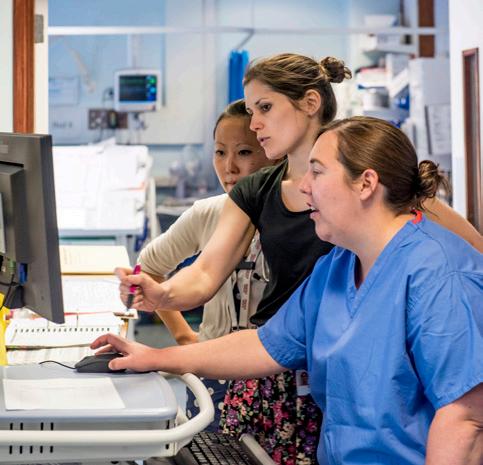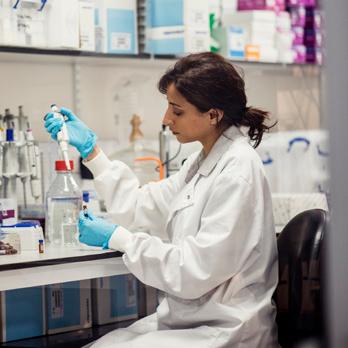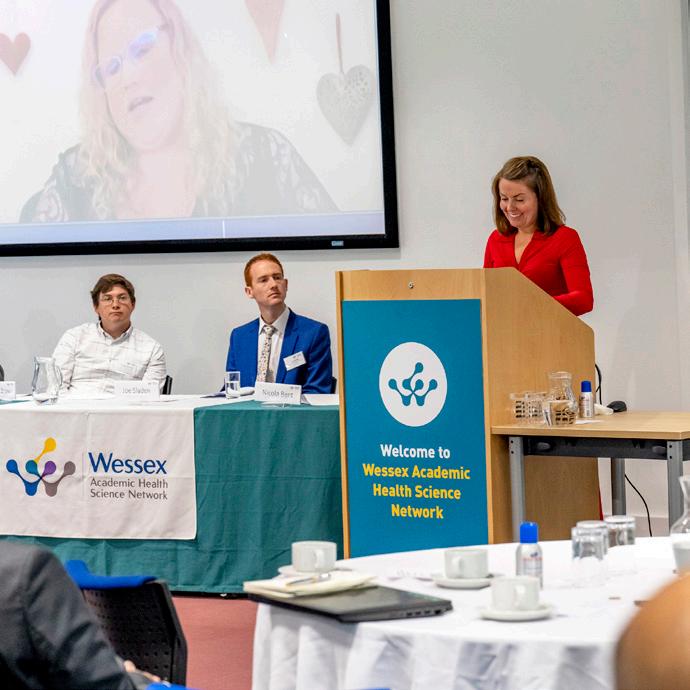
















Our 2024-25 business plan aims to build on the strong capabilities and achievements of the past 11 years. Over the last 12 months we have grown and strengthened positive relationships with our local integrated care board (ICB) members and wider system partners. These collaborative efforts have led to the co-production of delivery plans that address local health needs and align with the ICB Joint Forward Plans and integrated care partnership (ICP) strategies. Our system-wide work has garnered recognition by regional NHS England teams as a replicable model.
As we move into 2024-25, we welcome fresh leadership, and a new name as Health Innovation Wessex (HIW). Bill Gillespie, our CEO, and Dave Meehan, our Director of Finance, took well-deserved retirements, having steered the organisation to great success. We are delighted that our Deputy CEO, Nicola Bent, has stepped up to drive Health Innovation Wessex to achieve continued progress and prosperity. She is ably supported by her executive team, with a new addition in Richard Booth as Director of Innovation Adoption and Deputy CEO, and Philippa Darnton who leads our evaluation service as Director of Insight.
We await the outcome of the Innovation Ecosystem Programme led by Roland Sinker, CEO of Cambridge University Hospitals NHS Foundation Trust, supported by the Innovation, Research, Life Sciences and Strategy (IRLSS) team in NHS England which will describe an NHS research and innovation blueprint operating model. One of its objectives is to review the current role of health innovation networks and make recommendations for our role as part of our new licence. The Wessex team has been supporting this initiative on behalf of the national Network. This is an exciting agenda with the potential to build on our strong local partnerships in research and innovation in the coming year.
A key strategic priority for this year will be to progress advances in genomics for our members and for the benefit of people that we serve, working in collaboration with the NHS Central and South Genomic Medicine Service Alliance and Wessex Health Partners. Wessex, as a region, has an incredible range of talent and the opportunities for our region brought about by the UK’s genomics strategy are being evidenced through the successful conference we jointly hosted in November 2023. A Wessex excelling in education, genomics research, and health and care delivery will benefit local patients, local populations, our workforce, our universities, our industry partnerships, and the taxpayer. With sustained systemlevel commitment, we believe these benefits can be realised.

In 2024-25, HIW sets an ambitious target of significantly growing our business portfolio to benefit our members, such as through the offer of health economics and data analytics capabilities, and a particular focus on the offer of real world evidence and evaluation support. We will cultivate fresh strategic partnerships, expand and diversify our offer, and seek alternative income sources, building on our unique selling point to provide a range of services across the innovation pathway. We also recognise the importance of upskilling staff as we adapt and take on the challenges of business development in the coming years.
Our business plan demonstrates our continued commitment to learning and embedding innovation at a system level through close collaboration with our members and system partners, but also working to scale innovation within the regions and nationally. We aim to develop cultures, processes, and capabilities that enhance discovery, accelerate development, and facilitate the deployment of innovations. Despite being a small organisation, we believe that our efforts can create significant, widescale, and lasting impact.

Fiona Driscoll Chair Health Innovation Wessex

Nicola Bent Chief Executive Officer Health Innovation Wessex


Finding and connecting innovators to health and care systems
Developing, testing, and evaluating innovations in the real world
Adopting and spreading innovations
Supporting our local systems
Creating the conditions to innovate and bring about change
At Health Innovation Wessex (HIW) we improve health, boost innovation, and support economic growth in our region’s life sciences and healthcare sector through the identification, adoption and spread of innovation.
We connect across the landscape of research, industry, commissioning provider trusts and the Wessex population, and bring together policy formulation and regulators, system design, operational frontline and stakeholder experience. This role takes us across all parts of the NHS, local government, and other public agencies, into universities and the voluntary sector, and from entrepreneurial startups into established industry. By working across the system, we evaluate impact and create the conditions for innovation to benefit the people of Wessex.
We deliver both national and regional programmes with an estimated split of resources for 2024-25 of 50% national and 50% local. Our national commissions are from NHS England (the Innovation, Research, Life Sciences and Strategy [IRLSS] group and the National Patient Safety Improvement Programme) and the Office for Life Sciences (OLS). The Wessex programmes are co-created to respond to the needs of our systems and delivered in partnership through our locality-focused delivery teams. Health Innovation Wessex works closely with our integrated care board (ICB) leads to ensure national and regional work is embedded within local delivery plans.
In 2024-25 work under the NHS England commission will focus on four national priorities:
• improve outcomes in cardiovascular disease (CVD)
• develop a high impact innovation pipeline
• tackle health inequalities, and
• improve patient safety.
These priorities are delivered through four Network-wide programmes:
1. cardiovascular disease (CVD) portfolio programme
2. MedTech Funding Mandate (MTFM)
3. Innovation for Healthcare Inequalities Programme (InHIP)
4. National Patient Safety Improvement Programme.


We will also support the national innovation pipeline through the following areas:
• horizon scanning and demand signalling
• innovator/innovation support
• data harmonisation
• medtech pathway programmes, and
• the NHS Innovation Service.
As well as developing and providing innovations which drive improvements in population health and patient outcomes, the health and life science sector provides high skill and high pay jobs and forms an important part of the UK economy. The government’s Office for Life Sciences (OLS) commissions Health Innovation Wessex to work with this sector, supporting economic growth for the UK whilst also delivering on patient outcomes through four core objectives:
1. Understanding the need and communicating demand
2. Support and signposting for innovators
3. Gathering real world evidence (RWE)
4. Spread and adoption of innovations.
To indicate the scale of this activity, over the year 2023-24, Health Innovation Wessex led the Network’s support by helping 145 innovators (around three new per week). At time of writing, we approach our annual economic growth impact survey. In 2022-23, innovators who responded to this survey attributed 89 new or safeguarded jobs and over £31m of economic growth to our support. The results of the 2023-24 impact survey are expected imminently.
We deliver our programmes through four areas of focus activity:
Our Industry and Innovation team provides a horizon-scanning and options appraisal offer to our health and care systems as they look to transform. We identify innovations that have already been successfully implemented in other regions and link them with NHS organisations. Leveraging our extensive network, we bring valuable insights from other NHS systems that have piloted or scaled innovations. Our horizon scan reports provide actionable recommendations to our members, fostering continuous improvement. We continue to offer this support for our members and priority programmes in 2024-25.
We have established a national consensus on best practice, and a platform for co-delivering on horizon scans enables completed work to be shared to minimise duplication. We also ensure that local and national innovation and research programmes are informed by our understanding of the challenges facing health and care systems.
We support innovators from commercial, clinical, academic, or other backgrounds to accelerate the development of their solution to reach patients faster and meet the needs of the NHS. Our support is offered across the breadth of the innovation journey from ideation to implementation. We understand the next stage that is needed and how to move onwards.
We are committed to ensuring that a consistent, high-quality service is provided to innovators regardless of location and sector. We have been instrumental in shaping national consistency across the Health Innovation Network, and in line with that, we deliver three distinct offers:
• A universal offer, available to all innovators and delivered by any health innovation network
• An enhanced offer, available to those innovators meeting stage-gate criteria and delivered by any health innovation network
• A distinctive offer, available to those innovators meeting stage-gate criteria and dependent on the specialist services provided by each health innovation network.



Often innovators need extra support to understand the implementation process and to prepare for real world delivery of their innovation. Innovations can fail due to the immaturity of the innovation or its implementation, resulting in low levels of adoption This can limit the rate of innovation spread and impact, contract renewal, or recognition as potentially effective and impactful suppliers to the NHS.
Innovators often seek implementation advice too late in their journey. Our in-house expertise on implementation is available to innovators in a three-tier offer as part of our OLS commission. We aim to reduce unsuccessful implementation as a barrier to adoption and spread, by:
• providing advice and guidance on implementation planning
• supporting innovators to develop and refine plans for implementation in our systems
• supporting the implementation of innovation by providing dedicated support to innovators.
The three-tiered approach, combined with our other offerings from our OLS commission, now provide total coverage to the Discover, Develop, Deploy pathway.
The national innovation support programmes encourage the development of promising innovations and the adoption of selected NICE-approved products. We also work with organisations delivering the NHS Clinical Entrepreneur Programmes (CEP Insights), Small Business Research Initiative (SBRI) Healthcare, and NHS Innovation Accelerator (NIA) to deliver our core services to innovators engaged in these programmes.
We will use the Health Innovation Wessex Network innovation pathway and Department of Health and Social Care (DHSC) medtech pathway where appropriate to provide consistent support to innovators, with access to all the available tools. This ensures that innovations meeting a clear demand signalled by the system progress through the innovation pipelines to proof of value and beyond to scale up, adoption and spread.
Health Innovation Wessex supports the NHS Innovation Service in two ways:
• We run the Needs Assessment Service which ensures co-ordinated input across the support organisations
• As a support organisation, we also work with innovators in the Service.
We update the pipeline and economic growth database quarterly as per national reporting cycles. All local programmes will have clear identification of the innovation being supported, and we will continue to conduct innovation scans according to the agreed approach and publish these scans on the FuturesNHS platform.
Health Innovation Wessex, together with the other 14 health innovation networks, will contribute to the development of the rules-based medtech pathway defined by the Accelerated Access Collaborative (AAC) in 2023. The pathway shows medtech innovators the steps needed to develop and prove the value proposition of a medical technology in a way that meets health and care system criteria. This programme will develop further during 2024-25.
The Wessex region is at the global forefront of diagnostic testing, pharmacogenomics and rare disease research as demonstrated by the successful Wessex genomics workshop co-hosted with Wessex Health Partners and the NHS Central and South Genomic Medicine Service Alliance in November 2023.
In 2024-25 HIW is committed to resourcing partnership working across our geography to bring together our local research and innovation ecosystem expertise, to support the translation of research into real world clinical practice and the delivery of health benefits for people in Wessex.


Our Insight team provides independence and rigour in generating evidence about the impact and implementation of innovation across local, regional, and national systems. We employ creative approaches to test and verify innovation and create clear, engaging narratives to support behaviour change. Our work supports the development of learning health systems which act fast to drive improvement by building system capability in the generation and use of insights from innovation adoption.
Our work spans various areas, including the impact of new services in mental health (Alternatives to Crisis, eating disorders and mental health in children and young people), maternity and neonatal care (such as the Southampton Hampshire Isle of Wight and Portsmouth [SHIP] Maternity Triage Line) and broader system, or organisational programmes such as the Dorset Innovation Hub and further evaluation for the InHIP programme in Hampshire and the Isle of Wight (HIOW). Collaborating with NIHR Applied Research Collaboration (ARC) Wessex, we are currently developing an evaluation toolkit to understand the impact of workforce changes. Additionally, through promoting the use of ATIS (our Attitudes Towards Innovation Survey), we aim to enhance organisations’ understanding of workforce innovation readiness and effective support for innovation adoption.
Our national work will include analysis of the impact of the Health Innovation Network Transforming Wound Care programme, and a review of NIHR ARC programmes on community falls prevention initiatives commissioned by the Department of Health and Social Care to inform policy recommendations.
Locally, we have made a new offer to HIW members to support up to five real world evaluations of innovation adoption during 2024-25.
To support innovation adoption, we know that it is imperative to establish solid economic evidence to instill confidence in the implementation of innovation. Following engagement from our members, HIW committed to further enhance our expertise and will be investing in specialist health economics capabilities in 2024-25. This strategic investment will lead our initiatives in health economics, supporting both local and national delivery plans.
Our health economics capacity will complement our insight capability to facilitate evaluative models to determine the cost effectiveness of interventions. Additionally, we will develop budget impact models and provide critical support in the decision-making process across the Wessex health and care system.
Clinical trials often establish the accuracy, sensitivity, specificity, and reliability of innovations, and innovators invest substantial effort in demonstrating that their product functions effectively. However, they frequently overlook the broader impact on patient pathways, populations, and workforce efficiency. Efficacy evidence alone may not suffice for buyers and decision-makers that also seek assurance of financial viability.
Our real world evaluation service, with expert input from our Insight and Industry teams, provides a range of offers to innovators and would-be adopters:
• advice and support on how to design an evaluation
• complete evaluation design, including what to measure, how to measure and how to identify appropriate analytics
• delivery of a complete evaluation by our in-house Insight specialists
• discover and support partners within our local health and care systems to participate in real world evaluations.
Our work with innovators enables them to understand the acceptability, adherence, feasibility, and sustainability of their innovations in practice, including local sites.
We have the capacity and capability to help innovators at all stages from finding the funds to conduct their evaluation, including provision of a national newsletter covering all open and upcoming funds, and specialist bid-writing support that has helped innovators to win over £30m during the last four years.
This year, in partnership with Wessex Clinical Research Network (WCRN), we will continue to support a pathway to link promising innovators to upcoming research funding and convene bid-teams to develop successful multi-agency grant applications. Health Innovation Wessex and WCRN jointly fund this impactful activity.


Innovation Network innovation spread programmes
In 2024-25 we will continue our focus on adopting a population health management approach to addressing CVD prevention and management and to addressing health inequalities. We will ensure equitable access to evidence-based and/or NICE-approved treatments (medicines, devices, medical technologies) all of which will be delivered in the context of ensuring the adoption and spread of innovation. Continuing our prevention work, we will add heart failure to our 202425 programme.
This portfolio approach will allow for population level interventions to be implemented while taking into consideration deprivation/health inequalities. It enables flexibility to support our ICB priorities while still meeting the delivery requirements of a Network-wide CVD programme.
Health Innovation Wessex will aim to reduce cardiovascular disease burden through the prompt identification of and/or optimal management of people with hypertension, high cholesterol, and heart failure through prevention, detection, and perfection (optimised treatment pathways). The aim is to reduce the number of heart attacks, strokes and hospital admissions associated with cardiovascular disease and heart failure. This builds on the current prevention programmes; Blood Pressure Optimisation and Lipid Management.
The Innovation for Healthcare Inequalities Programme (InHIP) aims to address local healthcare inequalities experienced by under-served populations. The programme builds on the Accelerated Access Collaborative (AAC), Healthcare Inequalities Improvement Team and Health Innovation Network’s achievements and learning to date in improving access to innovations in healthcare for the general population, and from InHIP wave 1 (October 2022-March 2024). The focus for the 2024-26 Wave 2 programme will be to scale the most impactful approaches from Wave 1 nationwide.
Project teams comprising clinical and non-clinical expertise from across the country are collaborating with their local communities to identify, address and minimise healthcare inequalities through projects that aim to improve access to proven health technologies and medicines, across the clinical areas of focus outlined in the Core20PLUS5 approach.
In Wessex, we will focus on spreading the CVD InHIP programme to support case finding of people with hypertension and atrial fibrillation contributing to primary and secondary CVD prevention.
The NHS has a reputation of being slow to adopt even the most evidenced innovations. It is also difficult for systems to identify which NICE guidance gives the best return on investment and what is the best procurement route. This leads to variations in care quality and inequitable patient access to innovative medical technologies.
Locally, Health Innovation Wessex will work with its NHS stakeholders to understand local barriers and enablers, broker relationships with the technology suppliers, support implementation and to bring together cross-regional learning to overcome barriers and support adoption and spread.
Seven MTFM technologies (with four under one clinical theme) joined the policy in 2022-23, listed below. We will continue to support the adoption of these technologies across our local clinical teams:
• XprESS multi-sinus dilation system to treat chronic sinusitis – with this product graduating and Health Innovation Network support ending in September 2024
• Thopaz+ - a portable digital system providing regulated negative pressure close to the patient’s chest and continuously monitors and records air leak and fluid drainage
• Spectra Optia - an apheresis and cell collection platform for the treatment of sickle cell disease
• A selection of four minimally invasive treatments for benign prostatic hyperplasia (BPH). (The selection will be based on local need.)
There is one new product for 2024-25 which launched in January 2024:
• AposHealth - a medical device worn on the foot that helps people with knee, hip and lower back pain relating to osteoarthritis.


Building on the work of the last nine years, the 15 national Patient Safety Collaboratives will continue as the main delivery arm to support the provision of the national patient safety improvement programmes described in the NHS Patient Safety Strategy.
The programmes for 2024-25 are:
Primary areas Health Innovation Network
Workstreams 2024-25
Optimisation and stabilisation of the preterm infant
Maternity and Neonatal
Early recognition and management of deterioration in women and babies
To test and spread effective safety interventions and strategies, learn from excellence and support systems to continuously improve
Medicines Safety
System Safety
Managing Deterioration
Perinatal Culture and Leadership programme
Reduce harm from opioids in chronic noncancer pain
Pipeline diagnostic: Psychotropics in Learning Disability +/- falls inducing medicines in frailty
Support the implementation of Patient Safety Incident Response Framework (PSIRF) across health and care settings
PIER in systems
healthinnovationwessex.org.uk
Martha’s Rule
Maternity and Neonatal Safety Improvement Programme (MatNeoSIP)
We will contribute to the national ambition to reduce the national rate of preterm birth from 8% to 6%, and to reduce the rates of maternal and neonatal deaths, stillbirths, and brain injuries that occur during or soon after birth by 50% by 2025.
This is delivered through two programmes:
1. Optimisation and stabilisation of the preterm infant and early recognition and management of deterioration of women and babies
2. Supporting the perinatal culture and leadership programme.
Medicines Safety Improvement Programme (MedSIP):
We will support the reduction of harm from opioids in chronic non-cancer pain through a system-wide approach. This includes:
• preventing initiation
• de-escalating
• finding chronic use
• treating (by tapering and offering biopsychosocial support)
• sustaining improvement.
System Safety Improvement Programme:
We will support and embed the implementation of the Patient Safety Incident Response Framework (PSIRF), which has four key aims:
• compassionate engagement and involvement of those affected by patient safety incidents
• application of a range of system-based approaches to learning from patient safety incidents
• considered and proportionate responses to patient safety incidents
• supportive oversight focused on strengthening response system functioning and improvement.



Managing Deterioration Safety Improvement Programme:
We will support the implementation of Martha’s Rule and system-wide management of deterioration using the Prevention, Identification, Escalation and Response (PIER) framework.
Outputs of this work are reported to the ICB System Quality Groups as well as relevant regional and national patient safety groups.
We continue to partner with the Health Foundation’s improvement network the Q Community, actively promoting opportunities and resources to our local partners, and as appropriate use the unique skillset of members as part of our patient safety work.
We enable health and care systems across Wessex to understand, adopt and spread proven innovation through applying tested tools and frameworks. Through co-production and delivery, we act on key priorities to sustain innovative solutions, deliver sustainable change, and ensure positive outcomes for the workforce and people across Wessex.
We also know that adoption at scale and sustainability is a significant challenge. To address this, we will focus on setting the right conditions for adoption at scale by identifying suitable innovations, building system workforce capability and capacity, and creating favourable conditions for innovation.
In April 2023, Health Innovation Wessex mobilised two delivery teams to collaborate with our integrated care systems’ (ICSs) three local priority areas.
1. Polypharmacy
2. Frailty virtual wards
3. Mental health.
Dorset:
1. Frailty virtual wards and technology-enabled care
2. Cardiovascular disease
3. Place-based partnerships.
Our 2024-25 local delivery plans have been developed in partnership with the ICBs and align with the ICSs Five Strategic Priorities and their Joint Forward Plans. Our local delivery plan supports NHS England’s 2024-25 national planning guidance and the ambitions of the NHS Long Term Plan.

Health Innovation Wessex (HIW) has agreed a two-part delivery portfolio which aims to reduce the impact of cardiovascular disease (CVD) and enable the faster adoption of innovation to improve local health outcomes.
The CVD portfolio will form a major part of the delivery plan, with workstreams supporting CVD prevention (blood pressure optimisation; lipid management; and familial hypercholesterolemia [FH]), and pathway changes to improve the identification and treatment of people with heart failure. We will explore the automation of CVD processes within primary care as an emerging area of delivery. HIW will support a secondary care cardiology or cardiac surgery workstream to enable innovation support across the whole CVD pathway – the detail of this workstream is to be scoped and agreed during quarter 1 2024-25.
Our plan aligns with the strategic aims and priorities outlined in the ICB’s fiveyear Joint Forward Plan. We emphasise equitable access to CVD care, addressing disparities in health outcomes. Our ambitious plan integrates cross-cutting themes such as net zero (environmental sustainability) and workforce development.
Adopting sustainable innovation at scale can be challenging, yet it is cited as one way to help support the NHS to be fit for the future. Our enabling innovation portfolio collaborates with the ICB to create favourable conditions for systematic innovation adoption. It commits to empower and upskill the ICS workforce to build capacity and capability to adopt impactful innovation. This workstream complements HIW’s national commissions and fosters an inclusive innovation adoption ecosystem.
Health Innovation Wessex’s focus for 2024-25 will align with the five pillars within the Dorset Five Year Forward Plan outcomes and how we can bring forward innovation to support delivery. The five pillars within the Dorset Joint Forward Plan are:
• Improving lives of people impacted by mental health
• Preventing children from becoming overweight
• Reducing the gap in healthy life expectancy
• Increasing the percentage of older people living well and independently
• Adding healthy life years to people in Dorset.
HIW will build on the successful place-based partnership work from the previous year with a focus on the Dorset neighbourhood teams and development within the local communities. Specific attention will be given to children and young people’s wellbeing, including obesity prevention and a mental health support offer to the ‘waiting well.’ Pathways for access to care related to neurodiversity will also be developed.

Our focus across all these workstreams will be on enabling faster adoption of innovation which improves the outcomes for these populations.
HIW aims to support the system to identify and support patients with long-term conditions. Initiatives include the completion of local cardiovascular disease prevention work, oral health access, innovation across all age groups, Women’s Health Hubs, and point-of-care testing to aid diagnostics and care pathways.
Our co-developed local plans align with the strategic priorities for both ICBs and key cross-cutting themes, ensuring an integrated approach to:
1. Reducing health inequalities: We prioritise equitable access to care, addressing disparities in health outcomes
2. Net Zero: Environmental sustainability is integral to our initiatives
3. Digital transformation: Leveraging technology for efficient and effective healthcare
4. Workforce development: Building capacity and capability within the ICS workforce
5. Equality, diversity and inclusion: Ensuring inclusivity in all aspects of our work
6. Patient safety: A fundamental commitment to safe and high-quality care.
These complement our national and regional commissions and will support the ongoing development of an innovation adoption ecosystem.
Recognising the value of collaborating across localities at a regional scale, we have identified several opportunities for the south west (Health Innovation Wessex, Health Innovation West of England, and Health Innovation South West) and south east (Health Innovation Wessex, Health Innovation Kent Surrey Sussex, and Health Innovation Oxford and Thames Valley) networks to work collectively on delivering enhanced health outcomes for our regions and ICSs. We ensure that best practice and learning from across our programme delivery is shared with our local and regional systems to bring demonstrable impacts and benefits to our members.
Across the south west, we will collaborate on the national and regional innovation spread programmes:
• Cardiovascular disease
• Cancer
• Maternity and neonatal safety
• Management of deterioration
• Core20PLUS5 health inequalities model.

Across the south east, collaborations will focus on the national innovation spread cardiovascular disease programme. In addition, Wessex will work collectively with Health Innovation Kent Surrey Sussex and Health Innovation Oxford and Thames Valley to deliver three innovation scans on the all-age neurodiversity (ND) pathway. The objective is to identify innovation that can support the efficient and effective delivery of ND services and improve outcomes for people through innovation adoption. The innovations identified through the scans will be presented back to NHS England South East regional team via three online roadshows.
The recent Chief Medical Officer’s annual report1 highlighted the impact of the growing number of older people living longer with multiple morbidity and polypharmacy. NHS England has highlighted polypharmacy as one of the key medicines opportunities for ICBs to pursue2
In recent work done in the north west3 , 16.5% of unplanned hospital admissions in adults were attributed to adverse drug reactions, with polypharmacy identified as a major driver and prevention target. The nationally extrapolated cost of these admissions (which also demonstrated an increased length of stay in those taking ten or more medicines) was £2.21 billion. This could be as high as £80 million for Wessex.
The Health Innovation Network Polypharmacy programme aims to help local systems to:
• Identify patients deemed to be at the greatest risk from harm from polypharmacy
• Upskill the primary care workforce to carry our high-quality structured medication reviews to reduce unnecessary prescribing
• Support patients to share their issues, concerns, and expectations about their medicines especially in their later years.
References
1 gov.uk/government/publications/chief-medical-officers-annual -report-2023-health-in-an-ageing-society
2 england.nhs.uk/long-read/national-medicines-optimisation-opportunities-2023-24
3 pubmed.ncbi.nlm.nih.gov/35788071
In 2024-25 the Polypharmacy programme will continue to be based around the three pillars for year three and consolidate the achievements seen in year one and two of the programme. Recognising the importance of the pharmacy community, we will continue to facilitate the local community of practice (CoP) and commit to delivering three CoPs, under Pillar 2, in 2024-25.
Population health management
Education and learning
Pillar 3
Changing public behaviour
Health Innovation Wessex has a formal collaboration with Wessex Cancer Alliance to support the spread and adoption of innovations for earlier diagnosis, in line with the NHS Long Term Plan to diagnose 75% of cancers at stage 1 and 2 by 2028. To achieve this, we continue to co-fund a programme manager with Wessex Cancer Alliance to accelerate the uptake of innovations leading to earlier cancer diagnosis.
This work supports all four core OLS functions, but is reported here as the overall aim is faster adoption, and includes:
1. Use of qualitative feedback from local clinicians and quantitative input from regional NHS data to understand system priorities. Working with industry and national data sources to understand potential matching innovations. Using this combined knowledge to continue developing the national cancer innovations horizon scan
2. Providing adoption support to at least two early adopter sites each year (agreed through either the national cancer team or the Wessex Cancer Alliance) to deliver pilots and/or ensure the appropriate progression from pilot to business-as-usual commissioning
3. Disseminate insights from local projects to Wessex Cancer Alliance, local cancer groups, national community of practice and the national NHS England Cancer Innovations team.

Health Innovation Wessex aims to create the conditions to encourage the discovery, development, and deployment of innovative solutions to address current and future system challenges.
Health Innovation Wessex is one of 15 founding partners, across health, research, and academia to establish Wessex Health Partners, with the core team appointed and functioning from April 2023. The core ambitions of the strategic partnership are:
• To improve the region’s collective ability to tackle the greatest challenges facing the Wessex health and care system
• To generate greater collaborative and interdisciplinary research and speed the development and adoption of innovation at scale.
In 2024-25 we will work with our partners to:
• Collaborate with other Wessex-wide research and innovation bodies to maximise the benefit of research and innovation to the local population
• Develop an approach for identifying implementation ready research to inform a deployment pipeline both at a national level (via the Health Innovation Network) and within Wessex
• Support ‘Discover, Develop, Deploy’ (3D) research and innovation projects to tackle the highest priority health and care problems together
• Be part of the WHP horizon scanning approach to identify, convene, and support interdisciplinary pan-Wessex funding applications to support innovation adoption
• Develop relationships with Wessex research structures via our Insight function to promote real world evaluation.



Universities play a pivotal role in enhancing health outcomes and driving economic growth within our region. This is achieved through their workforce training and by fostering clinician innovators. As active members of our board all six institutions can leverage our links to local health and care systems. We aim to use our experience in facilitating collaborations between health providers and academia to translate clinical trials into real world settings.
Health Innovation Wessex assists clinical innovators to navigate the funding landscape. We provide valuable information on grants and funding opportunities, as well as offering support in bid writing and project development.
In 2023 HIW supported several university events, including, for example, Responsible Innovation in Health Technology hosted by the University of Southampton. We also welcomed academic staff to several of our own events (e.g. our evaluation masterclass and funding masterclass). We have also designed and run a full day workshop on intellectual property (IP) aimed predominantly at University of Southampton staff. In the coming year, we will run the IP course again.
Our Director of Insight is also Implementation Lead for NIHR ARC Wessex. Through collaborative programmes of work in implementation and knowledge mobilisation, we will optimise the uptake and impact of findings and innovations from applied health research. These include:
• a review of ARC programmes on community falls prevention initiatives to inform policy recommendations
• mapping ARC applied research outputs to Wessex ICS priorities, and
• developing an easily accessible Workforce Evaluation Toolkit for our system partners that responds to an expressed need.


Artificial intelligence (AI) and related technologies have the potential to transform many aspects of patient care and healthcare administrative processes. Applicable technologies are machine learning (neural networks and deep learning), natural language processing, physical robots, robotic process automation (RPA), diagnosis and treatment support applications, and patient engagement and adherence applications. There are still challenges to overcome to bring these technologies into daily clinical practice. However, the NHS Long Term Plan views AI as a key element in digital transformation that will be increasingly utilised.
Together with the Health Innovation Network, Health Innovation Wessex will contribute to a learning and support system that enables health and care teams in England to rapidly connect, learn from each other, share successes and valuable learning from challenges and in doing so raise the ambition to co-design solutions with staff and citizens to scale the implementation of AI technologies. This includes building practical tools and guidance to support other organisations with AI adoption. This programme will develop during 2024-25.
Health Innovation Wessex will contribute to a planned community of practice which aims to capture and report the effectiveness of approaches and methods for implementation and spread to share learning and generate more consistent application. We will continue to strengthen the Health Innovation Network’s knowledge as implementation experts, both individually and collectively in this field, to realise the full impact of programmes of work.
Our team has developed and refined our own implementation and deimplementation models. These models are informed by years of practical experience and real world application in delivering national and local programmes. Our expertise enables us to operate effectively and be a credible voice in the innovation ecosystem.
HIW, now a continuing professional development (CPD) registered organisation, aims to enhance its offer through accredited courses, masterclasses, action learning sets, webinars, and workshops. In 2024-25 we will deliver applied innovation implementation courses to enhance the capabilities and skills of the health and care workforce, which will complement our range of courses delivered to innovators by our Industry and Innovation team.

The cross-cutting themes are woven throughout all our programmes:
• Health inequalities
• Patient safety
• Patient Partners and Community Conversations
• Environmental sustainability (NHS net zero)
• Workforce
• Data harmonisation.
Equality, diversity and inclusion activity underpins our work to reduce health inequalities.
Wherever possible we support innovations that not only help the delivery of national and local programmes but address these key system priorities.
During 2023-24 we strengthened our approach with an internal training programme for staff, actively participated in and facilitated ICB and provider organisation health inequalities workshops, and have a seat on ICB health inequalities boards, and shared learning from the delivery of our Innovation for Health Inequalities Programme (InHIP). In 2024-25 we will continue to embed tackling health inequality, and address issues related to equality, diversity, and inclusion across all our work programmes including spreading the CVD InHIP programme; building tools, approaches, and metrics to demonstrate impact where possible.
These tools form part of our standardised approach to scale and spread and are shared with ICBs and frontline stakeholders via our implementation work. We have also developed a health inequalities toolkit to support innovators.
We remain committed to the delivery of the NHS Patient Safety Strategy and our vision is aligned to the national strategy: ‘for the NHS to continuously improve patient safety.’ We will achieve this through the Patient Safety Collaborative commission but also through the lens of patient safety in all our clinically led programmes, pipeline and health inequalities work.


We have a strong commitment to patient and public involvement working closely with established engagement groups to ensure we use appropriate mechanisms to reach communities; and vitally, to understand local engagement needs.
For Wessex, Patient Partners and Community Conversations (PPCC) involves programmes of work actively engaging with involvement forums, the voluntary sector and support mechanisms including Healthwatch, the Wessex Public Involvement Network, and local community leaders.
We gain tremendous benefit from the involvement of patient representatives in our work. They are fundamental in ensuring our PPCC strategy remains aligned to our core values and complements the Health Innovation Network patient and public involvement strategy.
The Greener NHS team, which works closely with NHS England’s Innovation, Research, Life Sciences and Strategy team (IRLSS) and the Office for Life Sciences (OLS) confirms the important offer that health innovation networks make in supporting healthcare innovators and contributing to horizon scanning, to identify the future pipeline of emerging greener innovations and to establish NHS needs through relationships with local partners.
In 2024-25 Health Innovation Wessex will continue to play an active role in the network-wide Environmental Sustainability Advisory Group (ESAG) and the Community of Interest (COI), enabling our programme leads to access best practice, knowledge around green innovations, and learning to translate into our delivery plans to support local NHS providers achieve their net zero ambitions. During this year we will also produce our corporate carbon reduction plan and develop a coherent roadmap to deliver our own net zero goals.
HIW embeds in every programme a focus on supporting regional and local workforce priorities through the identification and spread of innovation that looks at new ways of working and delivering care, whilst also focusing on activities that support staff wellbeing.
We support our local systems with innovations that create efficiencies in complex processes, release time in busy schedules, and facilitate working together to improve the experience of working in health and care for everyone.

The Health Innovation Network aims to create a unified reporting system across all commissioned programmes, to better demonstrate the value and impact of the Network. The delivery plans for data harmonisation will be dependent upon additional planned investment following a more detailed specification on future requirements. Wessex will continue to support this work as it develops during 202425, with a nominated representative being part of a national working group
In recent years, our organisation has enjoyed stable revenue streams from national commissions providing a reassuring foundation. However, the predictability of our income is challenged by the certainty of change and the need for agility.
Consequently, our priorities must evolve to cultivate fresh strategic partnerships and to diversify our offer, highlighting tangible and influential outcomes. These imperatives are vital for our organisation’s viability and longevity in this dynamic environment.
In 2024-25 we will set out a coherent and ambitious strategy for business and new product development which encourages a culture of diversification, agility, and adaptive responses to achieve our commitment to deliver health and wealth benefits across Wessex.
Our ambition is to significantly grow the business portfolio in 2024-25, particularly that of the Insight team. Our strategy includes creating new opportunities to use our expertise in evaluating innovation and implementation (e.g. as a supplier on national evaluation frameworks), building new collaborations locally and nationally (working with Wessex Health Partners and NIHR ARC Wessex) and extending our reach into new sectors, including local authority and voluntary, community and social enterprise (VCSE) organisations. We will seek to market our expert resources including our Attitudes Towards Innovation Survey (ATIS), Rapid Insight and training materials.
We recognise that incorporating strategic partnerships into our business plan can offer a range of benefits that can significantly bolster our organisational advantage, capabilities, and market reach. A collaborative approach can lead to accelerated impacts for our members through the exchange of ideas, technologies, and best practice.
We will approach any strategic partnerships with a clear understanding of shared goals, aligned values, and well-defined roles. Our preferred partnerships will be established with a long-term view, focusing on mutual value creation rather than short-term gains.

We actively uphold and celebrate our values and behaviours which encourage innovation, inclusivity, collaboration, achievement, and trust. Our staff engagement groups shape the organisation’s culture, enabling people to flourish despite times of challenge, change, and high demand.
Our culture is a central element to our work, recruitment and development process, and our day to day working life. We encourage organisational growth and learning, actively encouraging feedback on ‘what went well’, to celebrate and recognise success, and ‘even better if’ to become a team always looking to improve.
Our strong belief in supporting both personal development and career goals is a continuous focus, ensuring that we support opportunities to develop skillsets to enhance programme delivery, professional fulfilment and organisational capability. We hold whole staff development days and will continue to offer learning opportunities to enhance staff skills in 2024-25. Other learning includes bespoke subject-matter workshops, alongside our regular Learning Labs and an extensive bitesize training offer.
Equality, diversity, and inclusion is fundamental to our core values to ensure a positive and supportive culture, where all staff feel empowered and respected. We actively encourage a work/life balance, and support hybrid and flexible ways of working. We ensure our staff are appropriately trained in the latest theories and practices around inclusion and diversity and are treated with fairness and equality.
The Health Innovation Wessex Business Support Team provides a vital corporate role supporting the internal delivery teams, senior leadership team and board members. Their long-established experience in delivering high-quality informative and inclusive interactions with our stakeholders at a local, regional, and national level ensures our reputation across the innovation ecosystem.


CVD is a multifactorial disease with patients presenting with several comorbidities. Adopting a multimorbidity approach to encompass conditions such as chronic kidney disease, obesity and heart failure will allow for sustainable reductions in CVD burden, leading to better patient outcomes.
Heart failure is a major health problem affecting approximately one million people in the UK. The NHS Long Term Plan (LTP) outlined that in England 80% of heart failure diagnoses are made in hospital following an acute admission, despite 40% of these individuals having signs and symptoms in primary care that should have triggered an earlier assessment. There are approximately 200,000 new diagnoses of heart failure each year and the average length of stay in hospital is eight days, with up to 100,000 admissions a year.
The Innovation for Healthcare Inequalities Programme (InHIP) aims to address local healthcare inequalities experienced by underserved populations. The focus for the 2024-26 Wave 2 programme will be to scale the most impactful approaches from Wave 1 nationwide. In Wessex, we will focus on spreading the CVD InHIP programme to support case finding of people with hypertension and atrial fibrillation contributing to primary and secondary CVD prevention.



In 2024-25 we will:
• Continue our focus on adopting a population health management approach to addressing CVD prevention and management and addressing health inequalities.
• Ensure equitable access to evidence-based and/or NICE approved treatments (medicines, devices, medical technologies), all of which will be delivered in the context of ensuring the adoption and spread of innovation.
• Continue our prevention work and add heart failure to our 2024-25 programme.
• Aim to reduce cardiovascular disease burden through the prompt identification of and/or optimal management of people with hypertension, high cholesterol, and heart failure through prevention, detection, and perfection (optimised treatment pathways).
Key objectives
The intended impact will be to reduce the number of heart attacks, strokes, hospital admissions associated with cardiovascular disease, and heart failure (HF). This builds on the current prevention programmes; Blood Pressure Optimisation and Lipid Management.
Support primary care staff to increase their CVD prevention and heart failure knowledge via educational webinars
Support increased uptake of CVD prevention and heart failure innovation at primary care network (PCN) level
Improved patient and staff awareness and distribution of CVD prevention and HF PPI resources +/- via eHealth platforms
Improved CVD Prevent and Quality and Outcomes Framework (QOF) data to address variations
Increased number of PCNs with community outreach projects for CVD case finding (InHIP)
The MedTech Funding Mandate aims to accelerate equitable patient access to medical technologies that are clinically effective, cost saving in three years (NICE approved) and affordable to the NHS (budget impact not exceeding £20 million) by providing integrated care system (ICS) commissioner funding to implement at scale (adoption and spread).
Aims
In 2024-25 we will:
• continue engagement with relevant stakeholders to understand local barriers and enablers, broker relationships with the technology suppliers, support implementation and to bring learning in from other regions to help overcome barriers and to support adoption and spread locally.
• support, where appropriate, with patient pathway, procurement, and business cases.
• support further development of ICB strategic decision-making and governance of innovation adoption.
Key objectives
The intended objective is to ensure patients have faster and more equitable access to NICE recommended medtech, and the delivery of this programme contributes to an improved innovation adoption culture for adoption of NICE recommended medical technologies.
Complete a stakeholder analysis for AposHealth to establish patient need/ clinical appetite in Wessex +/- round table events
Support increased uptake of products available on the Mandate across Wessex
Collect local learning to provide clarity on which NICE-recommended medtech is most clinically effective and cost saving
Continuously improving patient safety involves building on the foundations of a learning system that takes account of a patient safety culture. Over the last nine years the 15 national Patient Safety Collaboratives have understood the importance of supporting the NHS to address the systems, processes and behaviours that make care less safe for patients and to support staff to continually improve as detailed in the NHS Patient Safety Strategy.
In 2024-25 we will continue to support the provision of the national patient safety improvement programmes to reduce error, harm, and death resulting from failures in the system.
• Medicines Safety Improvement Programme (MedSIP): reduce harm from opioids in chronic non-cancer pain through a system-wide approach.
• Maternity and Neonatal Safety Improvement Programme (MatNeoSIP): contribute to the national ambition to reduce the national rate of preterm birth from 8% to 6%, and to reduce the rates of maternal and neonatal deaths, stillbirths, and brain injuries that occur during or soon after birth by 50% by 2025.
• System Safety Improvement Programme: support and embed the implementation of Patient Safety Incident Response Framework (PSIRF).
• Managing Deterioration Safety Improvement Programme: support the implementation of Martha’s Rule and system-wide management of deterioration using the Prevention, Identification, Escalation, and Response (PIER) Framework.


Medicines Safety: for ICBs engaged in the programme to have a self-sustaining whole system approach to opioid reduction by March 2025
Maternity and Neonatal preterm optimisation: all organisations to have adopted and sustained all nine interventions by March 2025
Maternity and Neonatal managing deterioration: all organisations to have tested and embedded early warning score tools for maternity and newborn by March 2025
Maternity culture: Support the Perinatal Leadership and Culture (PCLP) teams to create and craft the conditions for a positive culture of safety and continuous improvement, enabling a more psychologically safe, collaborative, and supportive workplace
System Safety: embed PSIRF in acute, community ambulance, mental health and independent providers contracted to provide NHS care including sustainability and measurement plans
Managing deterioration: Support the implementation of Martha’s rule and systemwide management of deterioration using the Prevention, Identification, Escalation, and Response (PIER) Framework



Following the formation of integrated care boards (ICBs) in July 2022, Health Innovation Wessex has been formally commissioned to support ICBs to meet their statutory priorities and secure continuous improvement in healthcare quality and outcomes through the adoption and spread of innovation.
Aims
In 2024-25 we will:
• support continued improved outcomes in population health and healthcare
• support teams to tackle inequalities in outcomes, experience, and access
• create opportunities to enhance productivity and value for money
• help support broader social and economic development.
Key objectives
All workstreams for 2024-25 will drive necessary transformational change and will have innovation at their core. We will enable the conditions to accelerate innovation adoption across our systems.
Key deliverables - Hampshire and Isle of Wight ICB Q1-Q4
Clinical Change Programme – cardiovascular disease and InHIP
Support the development of the Hampshire and Isle of Wight heart failure strategy and pathway
Preventing CVD (blood pressure optimisation, lipid management)
Carry out evaluation of Virtual Wards/@home and D_REACH (cardiac rehab) pilots
Support the spread of InHIP to Isle of Wight, Portsmouth and Southampton
Enabling the adoption of technology to automate blood test result filing in a selection of PCNs in HIOW
Enabling Innovation Adoption
Development and delivery of applied innovation adoption workshops
Support the ICB to develop a strategic approach to innovation by exploring current practice, attitudes and ambitions towards innovation
Support the development of a policy and process to enable the ICB to address challenges through industry partnerships
Establish an agreed approach to supporting economic growth priorities for the ICB
Children and Young People (CYP) Healthy Weight
Facilitate a system logic model to help clarify this work and priority areas and sharing of best practice from the national Health Innovation Network and other sources
Convene south west regional group focused on innovation for prevention
Identify research developed tools for the prediction of obesity (ARC tool)
Undertake an innovation scan to identify possible innovations for implementation
Lead the pilot of obesity prediction tool and implementation of innovation into Dorset


Children and Young People with mental health issues: Waiting Well
Support system steering group and workshops with the development of a system logic model and sharing of best practice from other areas and health innovation networks
Undertake an innovation scan to identify innovations to support CYP / parents and carers and schools whilst waiting for diagnosis
Lead and deliver the implementation of appropriate innovation identified
Support system steering group and workshops with development of slides, logic model and sharing of best practice from other areas and health innovation networks
Provide insights and learning and support the creation of a virtual hub with sources of information linked to women’s health
Undertake innovation scans on the key priority areas which include menopause, long acting reversible contraception (LARC), pelvic health and young women’s health
Lead the implementation of innovations to support the hub priorities and projects
Proactive care
Support system group and workshops with development of logic model and sharing of best practice from other areas and health innovation networks
Provide insights and learning from the HIW proactive audit
Develop an overview of the patient activation measure (PAM) tool, alternatives and information to enable further discussion around plans in Dorset, condition areas of interest and next steps
The World Health Organisation (WHO) has highlighted the inappropriate use of medicines as a major problem worldwide. It estimates that more than half of all medicines are prescribed, dispensed, or sold inappropriately, and that half of all patients fail to take them correctly.
As people live longer with more chronic and long-term diseases, it is increasingly common for people to experience problematic polypharmacy. Polypharmacy simply means many medicines on a long-term basis and problematic polypharmacy is an ongoing and growing challenge for the NHS.
The Health Innovation Network Polypharmacy programme aims to help local systems to
• Identify patients deemed to be at the greatest risk from harm from polypharmacy.
• Upskill the primary care workforce to carry our high-quality structured medication reviews to reduce unnecessary prescribing.
• Support patients to share their issues, concerns, and expectations about their medicines, especially in older years.


In 2024-25 the polypharmacy programme will continue to be based around the three pillars for year three and build on what has already been achieved in year one and two of the programme:
Deliver the national NHSBSA polypharmacy comparators webinar on a bimonthly basis
Deliver one Action Learning Set (ALS) south cohort
Deliver at least one ALS Foundation course
Deliver a series of polypharmacy masterclasses aimed at primary care clinicians and focusing on:
1. Antipsychotics in older people with dementia
2. Antidepressants in older people
3. Medicines and falls in older people
4. Pain management in older people.
Hold a minimum of three Wessex-wide Polypharmacy Community of Practice sessions a year
Promotion of Me and My Medicines patient facing materials with adoption in one Core20 practice including a case study


The NHS Long Term Plan (LTP) sets out ambitious aims for improving cancer care in the UK. This includes diagnosing 75% of cancers at stages 1 and 2 and helping an additional 55,000 people each year survive for five years or more following cancer diagnosis.
With a focus on these targets, the Wessex Cancer Alliance (WCA) and Health Innovation Wessex work together to identify innovations to adopt and spread to enable teams across Wessex to achieve this ambition.
The primary aim of the programme is to spread the adoption of innovations that have been tested and proven to support the increase the numbers of cancers diagnosed at an early stage. This includes innovations identified by the national cancer innovation group and those identified by Wessex cancer teams that address local, unmet needs.
Use qualitative feedback from local clinicians and quantitative input from regional NHS data to understand system priorities. Work with industry and national datasources to understand potential matching innovations. Provide adoption support to at least two early adopter sites each year to deliver pilots and/or ensure the appropriate progression from pilot to business-as-usual commissioning, and disseminate insights from local, regional, and national projects.



Provide project management support to existing cancer innovation pilots established under the programme
Support applications for external funding: working with WCA, members from the ICBs and local cancer teams, identify and support grant applications that will enable the delivery of innovation pilots
Review accessibility and impact of innovations: working with project teams and relevant members of WCA, review accessibility and equality of cancer innovation pilots
Explore plans and opportunities to pilot innovations to support the workforce: e.g. supportive technologies
Work with primary care leads for cancer and members of upper gastrointestinal (GI) clinical advisory groups (CAGs) from both ICSs to understand the interest and capacity to deliver capsule sponge clinics
Working with WCA members and interested clinical teams, develop and implement plans for the spread of capsule sponge tests
Contribute to and share learning from project
Provide project management support to the Dorset pilot lead
Support the Dorset ICB cancer team to liaise with industry in developing health economic impact
Share learning from the project with regional and national stakeholders
The Health and Life Science sector is a key part of the UK economy, creating high skill jobs. Developing innovations that can benefit patients requires deep understanding of the value proposition, NHS payment systems, regulatory frameworks, public sector procurement, product safety and information governance. Health Innovation Wessex is commissioned to accelerate the pace at which innovations reach patients and clinicians by supporting innovators as they develop and evidence their solutions.
The Industry & Innovation programme aims to accelerate the development of innovations and their evidence base, to improve patient outcomes, value for the NHS, and to grow the UK health and life science economy. The programme ensures innovations are aligned to NHS needs, developed to appropriate standards, supported by suitable evidence and visible to the right systems. In addition, we have a partnership with Wessex Cancer Alliance to support earlier cancer diagnosis in line with the NHS Long Term Plan.
Work collaboratively with innovators from commercial, academic or clinical backgrounds as well as stakeholders in our universities and NHS bodies to accelerate the development, evidence and deployment of innovations across Wessex.
Specifically, regarding cancer, to accelerate the identification and deployment of innovations which enable diagnosis at stage 1 and 2 rather than stages 3 and 4.


Understanding the need and communicating demand
- Enabling and providing horizon scans for local regional and national bodies
Signposting and supporting innovators
- Universal offer to all innovators
- Enhanced and distinctive offers to some innovators
Real world evidence
- Advise, design, and implement evaluations
Spread and adoption
- Advise, design, and deliver implementation plans



Promising innovations may lack robust evidence to support NHS adoption, or conversely, the uptake of proven innovations may be poor because of a lack of alignment with system levers. Insights from innovators, patients and organisations enable systems to decide what innovations to adopt and how to optimise the success of adoption in their local context. These insights might include patient, carer or staff perceptions of the impact of an innovation, or their experiences of how an innovation was implemented. Health Innovation Wessex has experience and expertise in evaluation, real world validation and rapid insight approaches to help capture and use this information.
The ambition for Insight is to significantly grow our business portfolio 2024-25 to benefit our members. Our strategy includes creating new opportunities to use our expertise in evaluating innovation and implementation, building new collaborations locally and nationally, and extending our reach into new sectors.
The Insight programme will work in partnership with our members and others to facilitate evaluations or rapid insight studies.
• It will address gaps in understanding about an innovation or a change in practice or capture new insights into areas of strategic importance.
• In doing so, it will also improve the capability and capacity of systems to capture and use evidence in decision making.
Independent commissioned evaluations – local and national
Support to Innovation Adoption team programmes
Advice and guidance on how to understand the impact and implementation of innovations, co-designed evaluations, and real world validation studies
Business development activities to operationalise the HIW and Insight business development strategies
Data analysis for national Polypharmacy Action Learning Sets